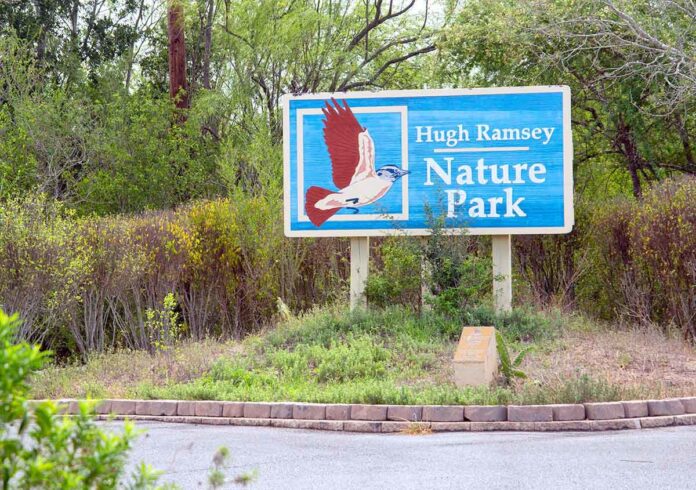HARLINGEN — For about 20 years, Christina Mild and a group of residents have planted native trees and shrubs along Hugh Ramsey Nature Park’s winding trails, helping to turn it into a World Birding Center site.
But today, visitors won’t find plants such as the horse crippler cactus.
That’s because thieves dug them out of the sandy soil, along with countless other native plants.
“They go out and plant trees and vegetation for wildlife and a week later it’s dug up,” Javier Mendez, the city’s parks director, said. “They say people are stealing trees.”
Now, city officials are planning to lay down the law to help stop the thefts at the park that’s turned into a haven for birders who flock to the city for the annual Rio Grande Valley Birding Festival.
Last week, city commissioners took the first step, voting to pass the first reading of an ordinance prohibiting entry into the park and the Harlingen Thicket between sunset and sunrise.
“The changes in hours are very important, not only because of plant theft but the theft of things like watering hoses and feeders — hummingbird feeders — and that can be an expense,” Mild, a Texas master naturalist, said.
Ordinance
The city’s proposed ordinance sets fines of up to $200 for the theft of plants — and the disturbance of wildlife.
“It is prohibited to disturb the wildlife and habitat, inclusive of vegetation damage such as possessing, destroying, injuring, defacing, cutting, removing, uproot, remove or destroy any branch, foliage, flower, plant or grass or disturbing from its natural state and wildlife disturbance such as injure, molest, disturb, harass or annoy, kill any bird, animal or reptile or intentional disturbance of wildlife nesting, breeding, injure, destroy, or rob the nest, eggs or young or other activities of any such bird, reptile or animal,” the proposed ordinance states.
The proposed ordinance also prohibits possession and use of alcohol and drugs, bars glass containers and bans motorized vehicles from the park’s trails.
Officials aren’t proposing the ordinance just to stop thieves from stealing plants.
For many residents, the park’s turned into a lover’s lane.
“In addition, there’s a lot of inappropriate sexual behavior that occurs all the time, especially in the dark,” Mild said.
Plant thefts
Since the mid 1990s, the group of naturalists has worked hard to turn the old landfill site into a birding destination marked by narrow, winding nature trails along the banks of the Arroyo Colorado.
But after thieves have stolen so many native plants from the nature park, Mild said she’s stopped planting cactus.
“We have very few barrel cacti because they’ve all been stolen and horse clipper cactus — those have been stolen. We no longer have any remaining,” she said.
For years, thieves have stolen as many as half of the native plants the group’s planted there.
“I’d say 50 percent of those recent plantings have been stolen,” she said. “A rare or uncommon plant of any good size is frequently stolen.”
Since its founding, naturalists dreamed of turning the park into an educational center, driving stakes into the ground to mark rare plants along the trails.
Now, they’ve pulled their stakes out of the ground.
“We’ve stopped putting ID signs next to plants because those plants would almost immediately be stolen,” Mild said.
Commissioners are expected to pass the proposed ordinance’s second and final reading during an upcoming meeting.
“We want people to use the park but not to abuse it,” Mild said.




